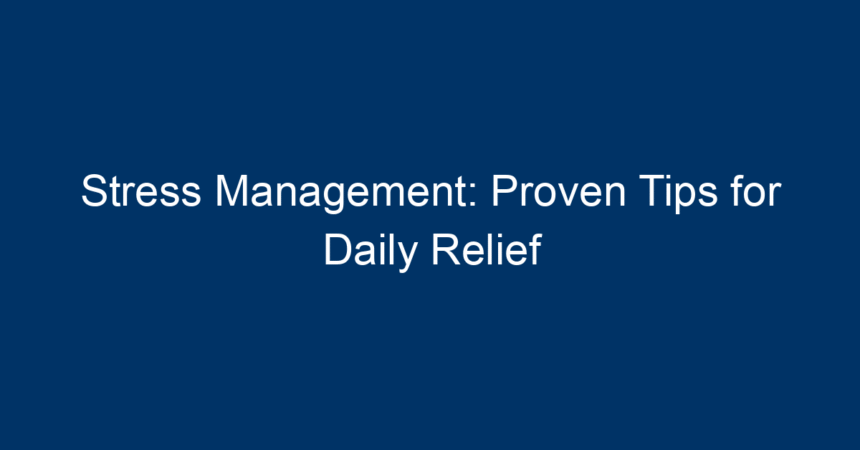In today’s fast-paced world, stress is an unavoidable part of life. From work deadlines to personal responsibilities, feeling overwhelmed is all too common. However, effective stress management is essential for maintaining mental, emotional, and even physical well-being. Fortunately, there are proven techniques that anyone can incorporate into their daily routines to find relief from stress. This article will explore actionable tips for stress management, offering insights to help you live a calmer, more fulfilled life.
Understanding Stress
Before diving into stress management techniques, it’s important to understand what stress is. Stress is the body’s natural response to demands or threats, often referred to as the "fight or flight" response. While some stress can be beneficial for motivation, chronic stress can lead to serious health issues, including anxiety, depression, and cardiovascular problems.
Types of Stress
-
Acute Stress: This is short-term stress, often caused by specific events like an upcoming exam or a tight work deadline. While acute stress is usually manageable, it can become overwhelming without effective coping strategies.
- Chronic Stress: This type of stress persists over long periods, often stemming from ongoing issues like job dissatisfaction or strained relationships. Chronic stress can significantly impact health and quality of life.
Recognizing Stress Symptoms
Understanding how stress manifests in our bodies is crucial for effective stress management. Common symptoms include:
- Physical: Headaches, fatigue, stomach issues
- Emotional: Anxiety, irritability, mood swings
- Behavioral: Changes in sleep patterns, social withdrawal, increased substance use
Recognizing these symptoms allows you to take proactive steps towards stress management before it becomes overwhelming.
Proven Stress Management Techniques
Now that you understand the basics of stress, let’s explore proven techniques for daily stress management.
1. Mindfulness and Meditation
Mindfulness is the practice of being present in the moment, while meditation involves techniques to focus and calm the mind. Research shows that mindfulness and meditation can effectively reduce stress levels.
- How to Practice: Try a simple breathing exercise. Sit in a quiet space, close your eyes, and take deep breaths. Focus on the sensation of inhaling and exhaling. Even five minutes a day can make a difference.
2. Regular Physical Activity
Engaging in regular physical activity is one of the most effective stress management techniques. Exercise releases endorphins, chemicals in the brain that act as natural painkillers and mood elevators.
- What to Do: Aim for at least 30 minutes of moderate exercise most days of the week. Activities such as walking, jogging, cycling, or yoga can all help reduce stress levels.
3. Healthy Eating
What you put into your body can affect your stress levels. A balanced diet rich in nutrients can improve mood and energy levels.
- Tips for Healthy Eating:
- Incorporate fruits, vegetables, whole grains, and lean proteins into your meals.
- Limit caffeine and sugar, as these can lead to jitters and crashes that exacerbate stress.
4. Quality Sleep
Adequate sleep is crucial for effective stress management. Sleep deprivation can increase stress and make you more susceptible to anxiety.
- Sleep Hygiene Tips:
- Establish a regular sleep schedule.
- Create a calming bedtime routine.
- Limit screens at least an hour before bedtime.
5. Time Management
Feeling overwhelmed often ties back to poor time management. Learning to prioritize tasks can alleviate stress significantly.
- How to Improve Time Management:
- Create a daily to-do list and prioritize tasks.
- Break tasks into smaller, manageable steps.
- Use tools like calendars or apps to keep track of deadlines.
6. Social Support
Having a strong support system can mitigate stress. Friends and family provide emotional support and practical help when needed.
- Ways to Build Support:
- Reach out to friends for coffee or a chat.
- Join clubs or groups that share your interests to meet new people.
- Don’t hesitate to seek professional support such as counseling or therapy.
7. Setting Boundaries
Being overwhelmed often stems from saying “yes” too frequently. Learning to set healthy boundaries is an essential component of stress management.
- Steps to Set Boundaries:
- Evaluate your commitments and identify which are essential.
- Practice saying “no” politely when necessary.
- Make time for yourself without guilt.
8. Laughter and Humor
Humor is a powerful stress reliever! Laughter can increase endorphins, relax muscles, and reduce stress.
- How to Incorporate Laughter:
- Watch a funny movie or TV show.
- Spend time with friends who make you laugh.
- Follow humor-related social media accounts.
9. Creative Outlets
Engaging in creative activities can distract from stressors and foster relaxation.
- Creative Activities to Consider:
- Painting, drawing, or crafting.
- Writing in a journal.
- Playing a musical instrument.
Conclusion: Taking Action for Stress Management
Incorporating these techniques into your daily routine may seem daunting at first, but small changes can lead to significant improvements. Start with one or two tips, gradually integrating more as you become comfortable. Remember, the goal of stress management is to find a balance that works for you.
Actionable Insights
- Start Small: Choose one stress management technique to try this week.
- Check-in Regularly: Set aside time to evaluate your stress levels and how your strategies are performing.
- Stay Consistent: Consistency is key in stress management. Make these practices a part of your daily life.
By actively engaging in stress management techniques, you empower yourself to handle life’s challenges more effectively, ultimately leading to a more balanced and fulfilling experience. Remember, it’s not about eliminating stress entirely but rather managing it wisely. Take charge of your stress, and reclaim your peace of mind.




